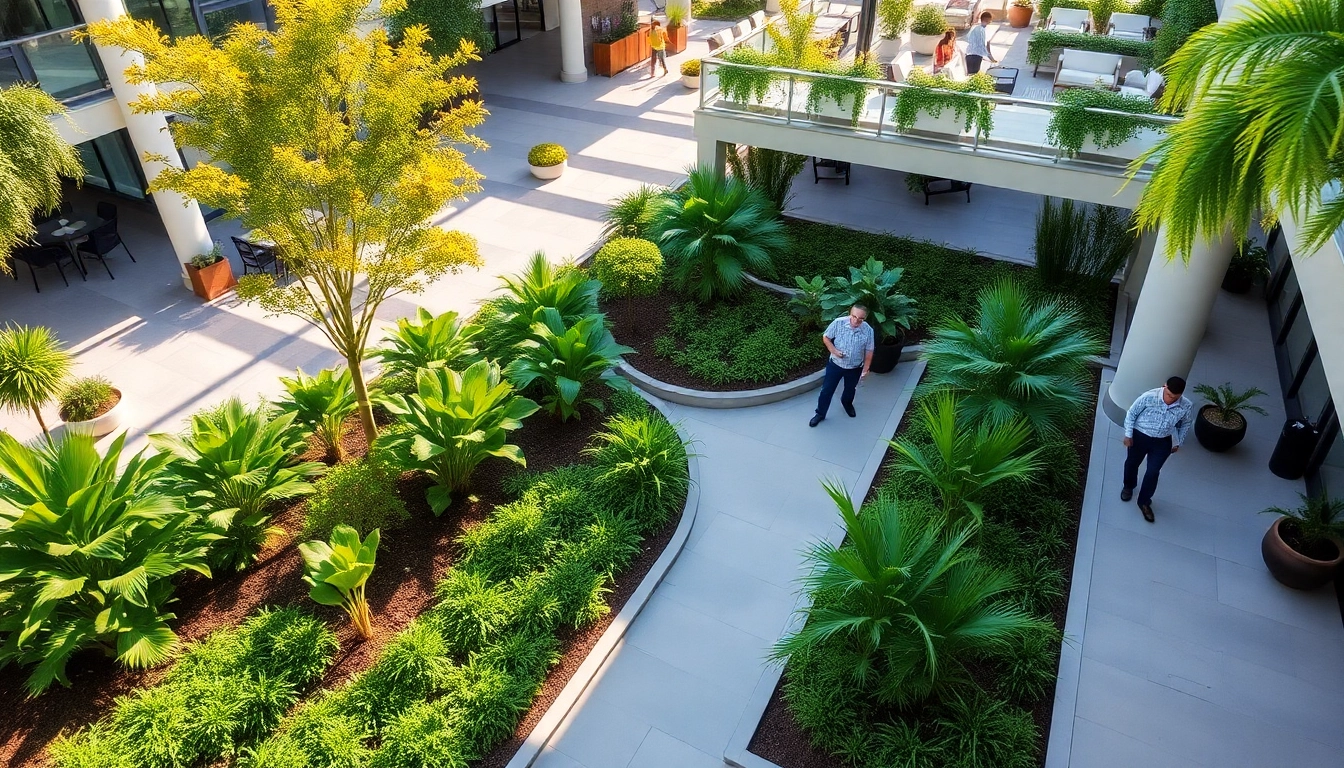Understanding Commercial Landscaping Contractor Services
What Do Commercial Landscaping Contractors Do?
Commercial landscaping contractors provide a range of services aimed at enhancing the outdoor environments of businesses, institutions, and other large properties. Their expertise lies not just in the aesthetics of landscaping but also in functionality, sustainability, and maintenance. Key services offered by commercial landscaping contractors include landscape design, installation, and upkeep. They often handle everything from designing intricate irrigation systems to laying down sod, planting trees, and even installing hardscapes such as patios and walkways. Moreover, they are adept at managing large-scale projects, ensuring that each aspect is executed in line with the client’s vision and local regulations.
Additionally, commercial landscaping contractors understand the unique needs of various sectors, whether they are working for retail spaces, corporate offices, hospitals, or educational institutions. They tailor their services accordingly to ensure that the landscaping not only complements the architecture of the buildings but also meets the functional requirements of these spaces. A well-maintained landscape not only elevates the property’s visual appeal but can also improve the overall experience of both employees and clients.
Why Choose Commercial Landscaping?
Selecting commercial landscaping contractors brings multiple advantages to property owners. Foremost, professional landscaping improves curb appeal, making businesses more attractive to customers. In competitive industries, first impressions matter significantly, and a well-designed landscape serves as a marketing tool, promoting a positive image and setting the tone for what clients can expect inside.
Furthermore, landscaping provides environmental benefits, such as reducing urban heat through shade provision and improving air quality through the absorption of carbon dioxide and pollutants. Well-planned outdoor spaces encourage biodiversity and make properties more sustainable. Also, many clients are increasingly seeking to incorporate native plants and eco-friendly designs, and seasoned commercial landscaping contractors are skilled in these eco-conscious tendencies.
Industry Trends Impacting Landscaping
The landscaping industry is continually evolving, shaped by technological advancements, changing consumer preferences, and environmental considerations. One of the most significant trends is the push for sustainable landscaping practices. This includes using drought-resistant plants, implementing efficient irrigation systems, and utilizing organic fertilizers. As businesses strive to reduce their environmental footprints, landscaping is increasingly designed with sustainability as a core principle.
Moreover, the rise of smart technology in landscaping is transforming how properties are maintained. Smart irrigation systems, which adjust water usage based on weather forecasts and soil moisture levels, help companies save on water costs and promote responsible water use. Furthermore, the trend towards outdoor living spaces has bolstered the demand for landscape designs that incorporate features like outdoor kitchens, firepits, and seating areas, enabling businesses to maximize their outdoor spaces for social gatherings and events.
Benefits of Hiring Professional Landscaping Contractors
Cost Savings and Efficiency
One of the main arguments for hiring professional landscaping contractors is the long-term cost savings they offer. While there may be an upfront cost involved in hiring experts, the investment pays off over time through savings on inefficient water usage, plant replacements, and the avoidance of costly mistakes that can arise from DIY attempts. Professional contractors come equipped with the knowledge and tools necessary to create efficient irrigation systems and select plants that thrive in a particular environment, which ultimately reduces the overall costs involved in maintaining the landscape.
Additionally, professional contractors can efficiently execute projects within prescribed timelines. Their experience allows them to anticipate challenges and address them proactively, ensuring that projects are completed on schedule and within budget. This efficiency is particularly beneficial for businesses eager to avoid disruptions caused by ongoing landscaping processes.
Access to Expertise and Quality
Commercial landscaping contractors bring a wealth of expertise that DIY enthusiasts cannot match. Their understanding of local flora, fauna, and environmental conditions means they can recommend the best plant varieties that will thrive in specific settings while meeting aesthetic goals. Furthermore, they stay updated on the latest landscaping trends and innovations, allowing them to provide insights that can elevate a client’s landscape well above average standards.
Quality is a hallmark of professional services. When hiring experts, property owners can expect a higher caliber of workmanship. Professional contractors use superior materials, advanced horticultural practices, and have access to the latest technologies, which all contribute to healthier, more visually appealing landscapes that endure the test of time.
Enhancing Property Value and Curb Appeal
A well-executed landscape can significantly enhance a property’s market value. For commercial properties, improving curb appeal can attract more clients and customers, making professional landscaping an essential investment. A visually appealing landscape creates a welcoming environment that encourages visitors to spend more time on the property, which in retail settings can directly translate into higher revenue.
Moreover, thoughtful landscaping contributes to a property’s competitive edge, especially in commercial real estate. Properties with well-maintained landscapes often command higher lease rates and attract high-quality tenants. A comprehensive landscaping plan that includes seasonal planting, regular maintenance, and aesthetic upgrades can continually elevate the property’s appeal and market performance.
Choosing the Right Landscaping Contractors
Key Qualities to Look For
When selecting a commercial landscaping contractor, it’s crucial to evaluate their qualifications and reputation. Key qualities to look for include experience in the industry, knowledge of local landscapes, and a commitment to sustainable practices. An established contractor should have a portfolio showcasing completed projects, highlighting diverse styles and functionalities suitable for different sectors.
Moreover, don’t overlook soft skills such as communication and professionalism. The contractor should be willing to listen to your ideas while offering advice based on industry best practices. A transparent contractor who provides clear timelines and budgets will likely lead to a smooth project experience.
Questions to Ask Potential Contractors
Prior to hiring commercial landscaping contractors, it’s essential to ask specific questions that can help gauge their suitability. Start by inquiring about their experience with similar projects; this can reveal their expertise and flexibility in addressing unique challenges that may arise. Additionally, ask about their licensing and insurance—these are vital for protecting both parties from potential liabilities.
It’s also beneficial to understand their design process. How do they integrate client feedback and ensure that the final product aligns with your vision? Inquire about their use of sustainable practices and their willingness to adapt to new landscaping trends. Finally, request references from previous clients to gain insights into their reliability, work quality, and overall satisfaction.
Evaluating Portfolios and References
A contractor’s portfolio serves as a vital tool to evaluate their style and capabilities. Look for diversity in their previous projects, as well as evidence of creativity and quality. Paying attention to the upkeep of their past designs will showcase their commitment to long-term success. Don’t hesitate to ask for before-and-after photos; this visual evidence can indicate their ability to transform outdoor spaces effectively.
Moreover, reaching out to references provides additional insights regarding the contractor’s communication, punctuality, and ability to solve problems during the project. A well-reputed contractor will willingly provide several contacts who can speak to their experience. Client testimonials can highlight areas of strength and inform your decision-making process.
Best Practices for Successful Landscaping Projects
Planning and Design Considerations
Effective landscaping is rooted in meticulous planning and thoughtful design. Initial consultations with contractors should focus on discussing goals, budget constraints, and preferences. They should conduct site assessments to understand environmental factors, including sunlight, soil quality, and drainage issues that may impact plant selection and layout.
Design considerations should balance aesthetics with functionality. Plan for how different areas of the landscape will be utilized, accounting for foot traffic, areas for relaxation, and potential advertising opportunities. Creating distinct zones within the landscape using pathways, changes in plant height, and different materials can enhance both the visual appeal and usability of the space.
Sustainable Practices in Landscaping
Sustainability in landscaping is more than a trend—it’s a necessity as businesses aim to reduce their environmental impact. Hiring contractors who prioritize eco-friendly landscaping practices ensures that the designs are both beautiful and responsible. This includes using native plants that require less water and maintenance, incorporating rain gardens to manage stormwater, and selecting materials that are sustainable and responsibly sourced.
Moreover, sustainable landscape maintenance can be achieved by minimizing chemical usage and employing organic alternatives. Encourage the use of mulch to retain soil moisture and reduce weeds. Implementing smart irrigation systems reduces water consumption, while fallow periods for lawn care can restore soil health. Ultimately, these practices contribute to a thriving green space that aligns with broader sustainability goals.
Maintenance Tips for Lasting Results
A dedicated upkeep plan is essential for preserving the beauty and health of landscaped areas. Establish regular maintenance schedules that include watering, pruning, fertilization, and weed management. Engaging professional landscaping contractors for ongoing maintenance ensures expert care while allowing property owners to focus on their business.
Employing seasonal changes in maintenance can optimize landscape performance. For example, spring is an ideal time for planting, while fall is perfect for mulching and soil rejuvenation. Additionally, establish a monitoring system to assess landscape performance, noting areas that may require more attention or adjustments. Adapting maintenance practices to evolving environmental conditions will promote a robust and flourishing landscape.
Measuring Success in Commercial Landscaping
Understanding ROI from Landscaping Efforts
Measuring the return on investment (ROI) from commercial landscaping initiatives involves assessing both quantitative and qualitative factors. Start by calculating the initial investment and ongoing maintenance costs against the projected increase in sales, tenant retention, and property value. Engage in comparative assessments by evaluating similar properties with and without professional landscaping services.
Additionally, consider the long-term benefits of landscaping, such as enhanced employee satisfaction and reduced absenteeism. Surveys can quantify improvements in employee morale or customer feedback, providing valuable metrics that contribute to ROI. Understanding these aspects gives business owners a comprehensive view of how their landscaping investments pay off over time.
Client Satisfaction and Feedback Techniques
Client satisfaction directly correlates with the success of landscaping projects. A proactive approach to gathering feedback post-project completion will help gauge customer satisfaction levels. Consider utilizing questionnaires that cover various aspects of the landscape, such as aesthetics, functionality, and general upkeep.
In addition to direct feedback, assess recurring client needs and preferences. Regular check-ins can foster long-term relationships with clients, showing them their opinions matter and can facilitate necessary adjustments for ongoing maintenance. Celebrating project successes on social media platforms can also enhance visibility and reputation, attracting new clients through testimonials and referrals.
Future-Proofing Your Landscaping Investments
To future-proof landscaping investments, consider scalability and flexibility during the design phase. Choose elements that can adapt over time, whether adding more features or transitioning to more sustainable plants and materials as trends evolve. Regular assessments of landscape performance allow property owners to stay proactive with upgrades and replacements.
Moreover, foster relationships with landscaping contractors who remain relevant to industry trends and can provide recommendations. Establishing a contingency plan for unexpected environmental changes or regional developments ensures that landscaping continues to deliver value, even as the landscape of business and eco-consciousness evolves. This ongoing commitment will lead to sustainable landscapes that endure for years to come.


